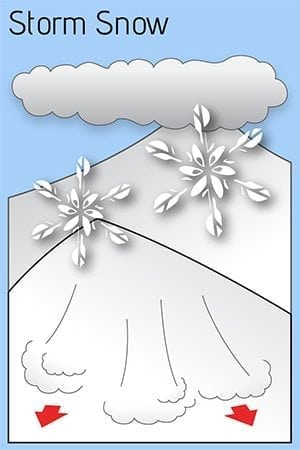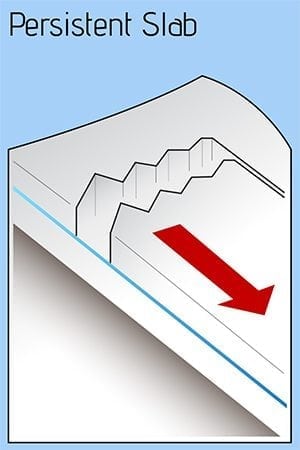Valdez
Above 4,000ftHigh
2,000 to 4,000ftHigh
Below 2,000ftConsiderable
The Avy Rose shows the forecasted danger by elevation and aspect.
It adds more detail about where you are likely to find the dangers mentioned in the forecast. The inner circle shows upper elevations (mountain top), the second circle is middle elevations, and the outer circle represents lower elevations.
Think of the Rose as a birds-eye view of a mountain, looking down from above. The rose allows our forecasters to visually show you which parts of the mountain they are most concerned about.
Degrees of Avalanche Danger
Avalanche Problems
Problem 1
A combination of factors has combined to create high avalanche danger today. First off and most important is the amount of new snow that our area has received in a short time. Valdez has received 18 inches of new snow at sea level in 24 hours that became top heavy overnight. Most of this snow fell in a 12 hour period. Thompson Pass DOT reported less, although significant snow is expected to have accumulated in upper elevation start zones.
Secondly is the hard, low friction (slick) bed surface this snow has fallen on. This surface will be difficult for the new snow to initially bond to making natural avalanches likely. And third the temperature increased overnight making storm slabs top heavy along with moderate to strong wind from various directions.
It is likely that much of the natural avalanche activity that will occur during this cycle happened early this morning during the peak of storm intensity. But north winds are expected to increase during the day loading new aspects that may fail naturally during the day. Human triggered avalanches will be very likely today 2-3 feet deep. Travel in avalanche terrain is not recommended.
Storm slab avalanches will have the potential to step down to deeper layers in our snowpack to create hard slab avalanches.
Likelihood:
- Almost Certain
- Very Likely
- Likely
- Possible
- Unlikely
Size:
- Historic
- Very Large
- Large
- Small
Trend
- Increasing
- Steady
- Decreasing
Problem 2
We currently have a thin (weak) snowpack in place. Prior to this storm the pack was comprised of thick windslabs on lee aspects that overly various old rain crusts. Windward aspects were scoured to old rain crusts, ground and old wind affected snow at upper elevations. Old rain crusts have promoted faceting above and below them creating significant faceting in the mid and lower snowpack.
These weak layers are currently being tested as a significant snow storm is affecting our area. The amount of snow we have received may not be enough to directly affect these layers yet. Although storm slab avalanches may have enough force to step down to these deeper layers creating destructive hard slab avalanches.
It is looking as though this will not be the only heavy snow event this week. These faceted layers near the base of our snowpack will receive increasing stress this week. It is possible that we will see a deep natural avalanche cycle this week if it didn’t already happen last night.
Likelihood:
- Almost Certain
- Very Likely
- Likely
- Possible
- Unlikely
Size:
- Historic
- Very Large
- Large
- Small
Trend
- Increasing
- Steady
- Decreasing
Avalanche Activity
11/14- Debris from a D3 natural avalanche at snow slide gulch ended 100 vertical feet above the Lowe river.
Large avalanches (D2-2.5)also occurred in multiple other locations including Berlin Wall, Catchers Mitt, South Three Pigs and Billy Mitchell. The activity extends beyond this list, and mostly occurred during the peak of warming and precipitation on 11/13.
Multiple natural D1-1.5 avalanches were observed on multiple aspects at low elevation. No step downs noted.
12/1- 2 D2.5 natural avalanches were noted on Three Pigs (Beaver slide, Pig Leg). Pig leg ran into the top 1/3 of the fan and Beaver Slide stopped near the end of its track. These both likely occurred during the outflow wind event 11/26-11/29.

D2 natural wind slab was observed on 40.5 mile peak on a west aspect ~3000′. Crown depth range estimated 1-2 feet and 200′ long

12/9- Several D2 natural wind slab avalanches were observed on S-W aspects at mid elevation in the intermountain region. Crowns appeared to be 1-3 feet deep. Catchers Mitt and Gully 1 were among the spots affected.
Weather
Check out our updated weather tab! A collection of local weather stations are available for viewing with graphs and tabular data included.
NWS Watches and warnings
Special Avalanche Bulletin Valdez Avalanche Center relayed by the National Weather Service Anchorage AK 935 PM AKST Sun Dec 11 2022 The following message is transmitted at the request of the Valdez Avalanche Center. ...THE VALDEZ AVALANCHE CENTER HAS ISSUED AN AVALANCHE WARNING... * WHAT...Avalanche warning. The avalanche danger is high. Very dangerous avalanche conditions exits. * WHERE...For the mountains in and around Valdez and Thompson Pass. * WHEN...In effect from Monday 12:00 AM to Monday 6:00 PM AKST. * IMPACTS...Snowfall will become heavy overnight along with rising temperatures and strong wind, creating widespread areas of unstable snow. Human triggered avalanches are very likely and large natural avalanches are likely on slopes steeper than 30 degrees. Debris from avalanches above may run into valley bottoms. * ADDITIONAL DETAILS...It is possible that 2 feet of snowfall may accumulate in the high elevations of the mountains in and around Valdez/Thompson Pass.
NWS Point forecast for Thompson Pass
Date Monday 12/12/22 Tuesday 12/13/22 Time (LT) 06 12 18 00 06 12 18 00 06 Cloud Cover OV OV OV BK OV OV OV OV OV Cloud Cover (%) 100 100 85 60 85 100 100 70 70 Temperature 24 23 19 14 15 19 23 22 21 Max/Min Temp 25 13 23 18 Wind Dir SE NE N NE SE SE SW S S Wind (mph) 23 20 20 8 8 18 11 13 6 Wind Gust (mph) 47 32 39 26 31 Precip Prob (%) 100 70 20 10 60 90 80 50 30 Precip Type S S S S S S S S 12 Hour QPF 0.24 0.02 0.31 0.31 12 Hour Snow 3.0 0.0 4.8 2.6 Snow Level (kft) 1.1 0.1 0.0 0.0 0.0 0.0 0.2 0.3 0.4
Click on link below for Thompson Pass weather history graph:

| Date:
12/12 |
24 hr snow | HN24W* | High temp | Low temp | 72 hour SWE* | December snowfall | Seasonal snowfall | Snowpack Depth |
| Valdez | 18 | N/O | 26 | 18 | N/O | 10 | 34 | 19 |
| Thompson pass | 12 | ~.8 | 28 | 8 | N/O | 8 | 109 | 26 |
| 46 mile | N/O | N/O | 18 | 0 | N/O | 2 | 2** | 16 |
*HN24W- 24 hour Snow water equivalent in inches
*SWE– Snow water equivalent
**46 mile seasonal snowfall total begins December 1st.
Additional Information
Our snow season began with above average precipitation and temperatures. Beginning in September, snow lines generally hung around 4500′ until 10/12. At that point our area received the first snow down to sea level with 12-16 inches on the north side of Thompson Pass.
On 10/15 wet conditions continued with the freezing line rising to 5000′ or higher. As skies finally cleared on 10/22 we were left with a thin rain saturated snowpack capped by a stout rain crust up to 4500′. Above 4500′ much deeper snowpacks existed due to significant early season snowfall at upper elevations.
Dry and cold conditions along with moderate outflow winds finished out the month of October.
On 11/1 precipitation returned with 18 inches of snow and ~1″ of SWE on Thompson Pass. This new snow was initially reactive with several natural D2 avalanches reported on Thompson Pass. These slides were running on a firm bed surface consisting of old rain crusts and old wind slabs from October.
On 11/4 a strong north wind event kicked up with 65 mph+ winds on Thompson Pass. Our snowpack received significant damage as already thin snow below 4500′ was stripped down to old wind slabs, rain crusts and the ground.
Precipitation returned on 11/8 and became heavy on 11/11. Storm totals of around 50 inches were recorded at Thompson Pass DOT between 11/8-11/13. Snow lines rose to ~3000′ near the tail end of the storm with heavy rain occurring in low lying areas.
Skies cleared on 11/14 through 11/18 with a strong temperature inversion setting up. Valley temperatures north of Thompson Pass fell to 0° F with above freezing temperatures existing above 4000 feet. Valdez temps remained mild. This weather allowed for widespread surface hoar up to 1 cm to develop in low lying areas.
Precipitation returned on 11/19, with incremental snowfall on Thompson Pass and areas north. The Valdez area received rain during this period. 12 inches have been recorded at TP DOT between 11/9-11/23.
11/26-11/29- Strong outflow (N) wind event. Many areas below 3000′ were stripped to the 11/13 rain crust, destroying the 11/19 BSH layer. Widespread very hard snow surfaces were the result.
Precipitation returned to our area on 12/5, with higher accumulation amounts near the coast. As storms cleared out on 12/7, they were directly followed by another round of strong north winds.
Alerts
The avalanche hazard is high above 2000 feet. Dangerous avalanche conditions exist. Human triggered avalanches 2-3 feet deep are very likely and natural avalanches are likely. Travel in avalanche terrain is not recommended
Posted by Gareth Brown 12/12 8:00am.
For a description of current avalanche problems, weather information, season history and more click the (+ full forecast) button. Avalanche forecasts will be issued Wednesday-Sunday.
Announcements

